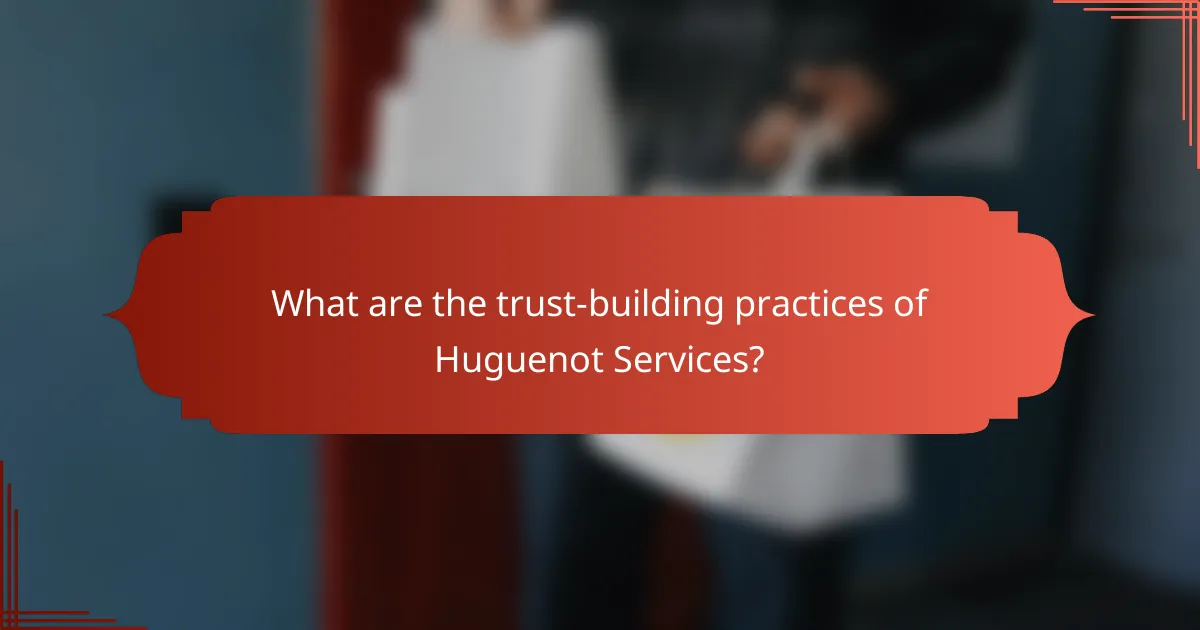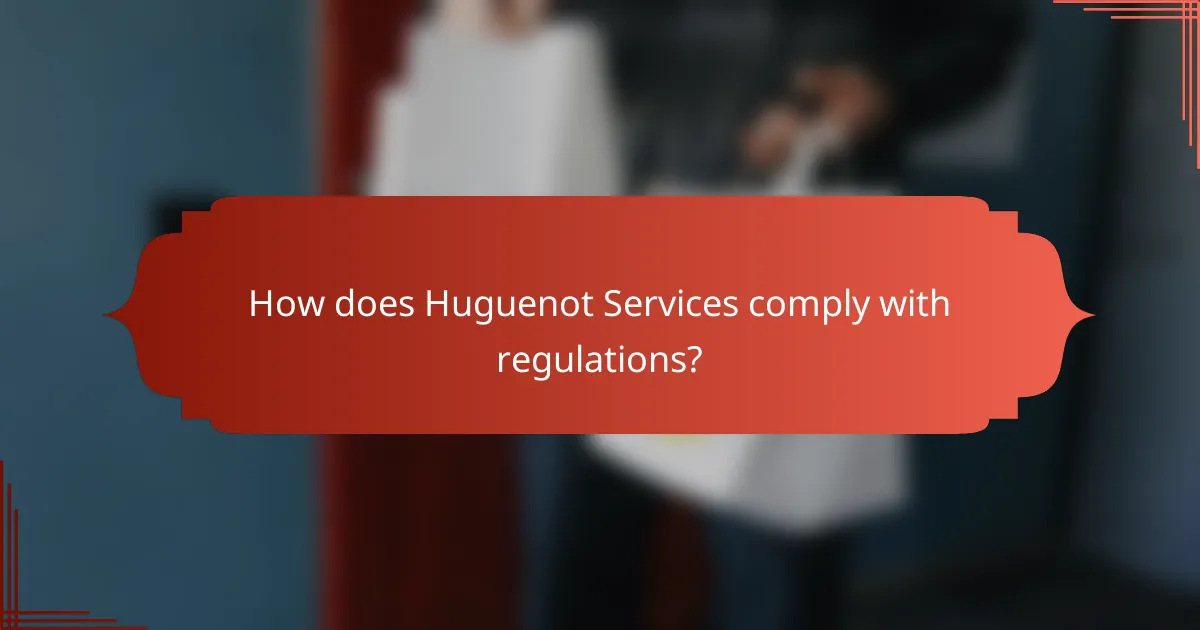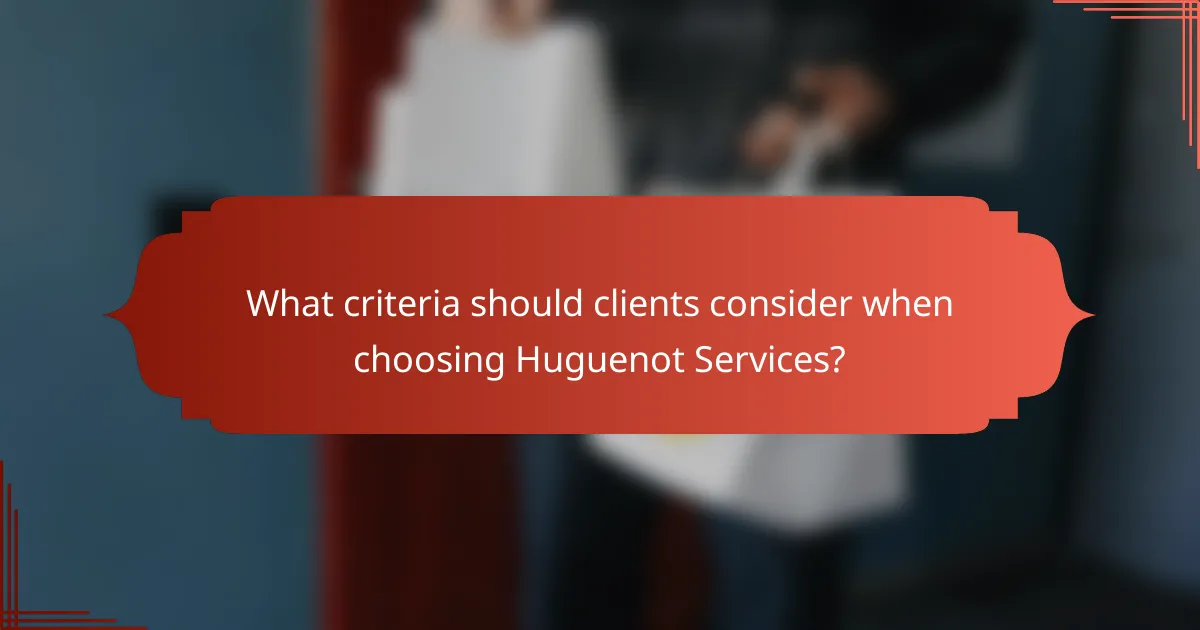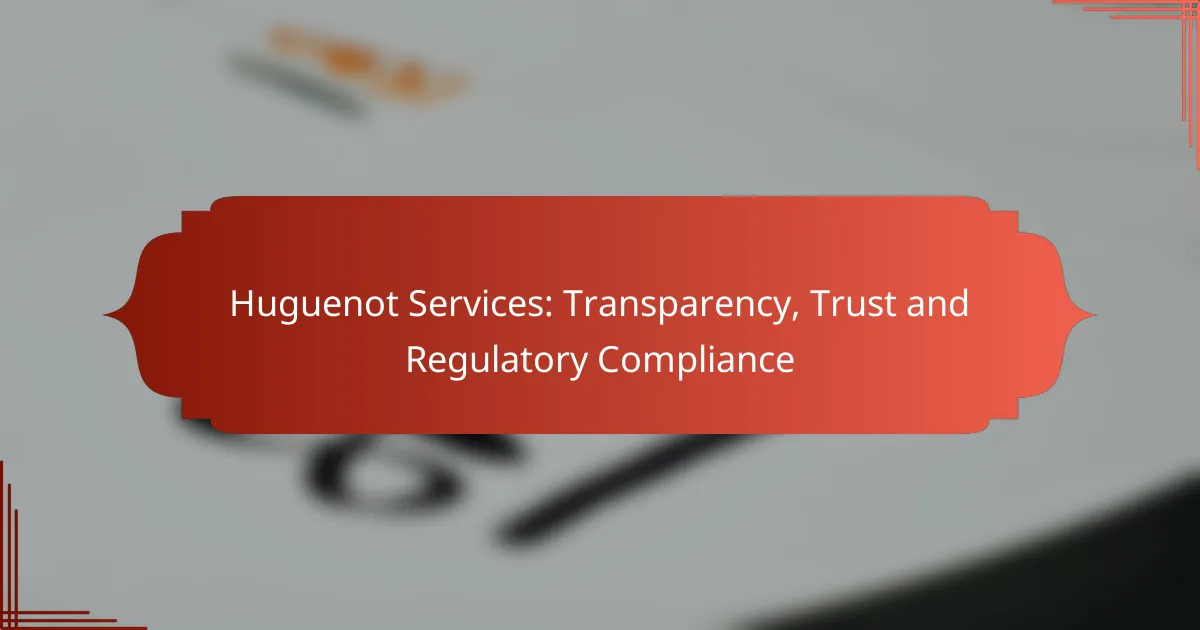Huguenot Services is dedicated to fostering transparency and trust in Ireland through clear communication, regular audits, and active client engagement. By showcasing client testimonials and partnering with reputable organizations, they build reliability while ensuring compliance with local regulations through structured practices and ongoing staff training.

How do Huguenot Services ensure transparency in Ireland?
Huguenot Services prioritize transparency in Ireland by implementing clear communication strategies, conducting regular audits, and actively seeking client feedback. These measures foster trust and ensure compliance with local regulations.
Clear communication of policies
Huguenot Services maintain transparency by clearly communicating their policies to clients. This includes providing detailed information on services, fees, and operational procedures, ensuring clients understand what to expect.
Regular updates and accessible documentation are made available online, allowing clients to review policies at their convenience. This proactive approach helps build trust and reduces misunderstandings.
Regular audits and reports
To ensure compliance and transparency, Huguenot Services conduct regular audits of their operations. These audits assess adherence to internal policies and external regulations, providing an objective evaluation of their practices.
Results from these audits are compiled into reports that are shared with stakeholders. This not only demonstrates accountability but also highlights areas for improvement, reinforcing their commitment to transparency.
Client feedback mechanisms
Huguenot Services actively encourage client feedback through various channels, such as surveys and direct communication. This feedback is crucial for understanding client experiences and identifying potential areas for enhancement.
By implementing changes based on client input, Huguenot Services not only improves their offerings but also shows clients that their opinions are valued, further strengthening the relationship built on transparency and trust.

What are the trust-building practices of Huguenot Services?
Huguenot Services employs several trust-building practices to foster transparency and reliability with clients. These practices include showcasing client testimonials, forming partnerships with reputable organizations, and obtaining relevant certifications and accreditations.
Client testimonials and case studies
Client testimonials and case studies serve as powerful tools for Huguenot Services to demonstrate its effectiveness and reliability. By sharing real-life experiences, potential clients can gain insights into the quality of service and the outcomes achieved.
These testimonials often highlight specific challenges faced by clients and how Huguenot Services successfully addressed them. This not only builds credibility but also helps prospective clients relate to the experiences of others.
Partnerships with reputable organizations
Huguenot Services collaborates with reputable organizations to enhance its credibility and trustworthiness. These partnerships often involve industry leaders and established entities that share similar values and goals.
Such alliances can provide clients with additional assurance regarding the quality of services offered. They may also lead to access to exclusive resources, training, and best practices that further improve service delivery.
Certifications and accreditations
Obtaining certifications and accreditations is a key practice for Huguenot Services to establish trust. These credentials often require adherence to strict industry standards and regulations, demonstrating a commitment to quality and compliance.
Clients can look for specific certifications relevant to the services provided, as these can indicate a higher level of professionalism and accountability. Regular audits and renewals of these certifications ensure ongoing compliance and improvement in service quality.

How does Huguenot Services comply with regulations?
Huguenot Services ensures compliance with regulations through a structured approach that includes adherence to data protection laws, ongoing staff training, and proactive risk management. This commitment helps build transparency and trust with clients while minimizing legal risks.
Adherence to GDPR standards
Huguenot Services strictly follows the General Data Protection Regulation (GDPR) to protect personal data of clients and employees. This involves implementing data processing agreements, ensuring data minimization, and obtaining explicit consent for data collection and usage.
Regular audits are conducted to assess compliance with GDPR, and any identified gaps are promptly addressed. This proactive approach not only safeguards personal information but also enhances the company’s reputation in the marketplace.
Regular compliance training for staff
To maintain regulatory compliance, Huguenot Services conducts regular training sessions for all employees. These sessions cover essential topics such as data protection, privacy policies, and ethical handling of sensitive information.
Training is tailored to different roles within the organization, ensuring that all staff members understand their responsibilities. This ongoing education helps prevent compliance breaches and fosters a culture of accountability.
Implementation of risk management strategies
Huguenot Services employs comprehensive risk management strategies to identify and mitigate potential compliance risks. This includes conducting risk assessments and developing action plans to address vulnerabilities in data handling processes.
By regularly reviewing and updating these strategies, the company can adapt to changing regulations and emerging threats. This proactive stance not only protects the organization but also reassures clients of its commitment to regulatory compliance.

What criteria should clients consider when choosing Huguenot Services?
Clients should focus on service offerings, reputation, and cost when selecting Huguenot Services. Evaluating these criteria ensures that clients receive reliable and compliant services tailored to their needs.
Service offerings and expertise
When assessing Huguenot Services, examine the range of services provided and the expertise of the team. Look for specific areas of specialization, such as regulatory compliance, risk management, or financial advisory services.
Consider the qualifications and experience of the professionals involved. A team with relevant certifications and a proven track record in the industry can significantly enhance the quality of service.
Reputation and reviews
Reputation is crucial when selecting Huguenot Services. Research client testimonials and online reviews to gauge the satisfaction of past clients. High ratings and positive feedback often indicate reliability and trustworthiness.
Additionally, check for any industry awards or recognitions that may highlight the firm’s credibility. Engaging with current or former clients can provide valuable insights into their experiences.
Cost and value analysis
Understanding the cost structure of Huguenot Services is essential for making informed decisions. Compare pricing models, whether they are hourly rates, flat fees, or retainer agreements, to find what aligns with your budget.
Evaluate the value provided in relation to the cost. A higher price may be justified by superior expertise or comprehensive service offerings. Consider requesting a detailed proposal to assess the potential return on investment.

What are the pricing models for Huguenot Services?
Huguenot Services offers various pricing models to accommodate different client needs, including hourly rates, flat fees for specific services, and subscription models for ongoing support. Each model provides flexibility and transparency, allowing clients to choose the best fit for their requirements.
Hourly rates for consultations
Hourly rates for consultations typically range from low to mid-hundreds of USD, depending on the expertise of the consultant and the complexity of the issues addressed. Clients are billed for the actual time spent during consultations, which can be beneficial for those needing specific advice without long-term commitments.
When considering hourly rates, it’s essential to clarify what is included in the consultation. Some firms may charge extra for follow-up communications or additional resources, so understanding the full scope of services is crucial.
Flat fees for specific services
Flat fees for specific services provide clients with a clear understanding of costs upfront, eliminating surprises. These fees can vary widely based on the type of service, such as compliance audits or document preparation, often ranging from a few hundred to several thousand USD.
Clients should evaluate the scope of services included in the flat fee. Ensure that all necessary components are covered, and inquire about any potential additional charges for extra work or revisions that may arise during the process.
Subscription models for ongoing support
Subscription models for ongoing support offer clients a predictable monthly fee for a range of services, which can be particularly advantageous for businesses requiring continuous compliance assistance. These models often range from a few hundred to several thousand USD per month, depending on the level of support needed.
When opting for a subscription model, consider the services included and the frequency of support. This model can provide significant value for clients who anticipate regular needs, but it’s important to assess whether the level of service aligns with your specific requirements to avoid overpaying for unused resources.
